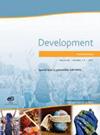Transitions in development - an interview with Aleksandra Pękowska.
IF 3.7
2区 生物学
Q1 DEVELOPMENTAL BIOLOGY
引用次数: 0
Abstract
Aleksandra Pękowska leads the Dioscuri Center for Chromatin Biology and Epigenomics at the Nencki Institute of Experimental Biology of the Polish Academy of Sciences in Warsaw, Poland, where she studies the role of astrocytes in brain development. Her research connects astrocyte chromatin architecture to broader questions about how these glial cells have influenced human brain evolution. We met Aleksandra over Zoom to discuss her career path so far. She told us about how she came to work on nervous system development, the interdisciplinary nature of her research group, and how she almost ended up studying law at university.
开发中的过渡——对Aleksandra的采访Pękowska。
Aleksandra Pękowska在波兰华沙波兰科学院Nencki实验生物学研究所领导Dioscuri染色质生物学和表观基因组学中心,在那里她研究星形胶质细胞在大脑发育中的作用。她的研究将星形胶质细胞染色质结构与这些神经胶质细胞如何影响人类大脑进化的更广泛问题联系起来。我们通过Zoom采访了亚历山德拉,讨论了她到目前为止的职业道路。她告诉我们她是如何开始研究神经系统发育的,她的研究小组的跨学科性质,以及她是如何差点在大学里学习法律的。
本文章由计算机程序翻译,如有差异,请以英文原文为准。
求助全文
约1分钟内获得全文
求助全文
来源期刊

Development
生物-发育生物学
CiteScore
6.70
自引率
4.30%
发文量
433
审稿时长
3 months
期刊介绍:
Development’s scope covers all aspects of plant and animal development, including stem cell biology and regeneration. The single most important criterion for acceptance in Development is scientific excellence. Research papers (articles and reports) should therefore pose and test a significant hypothesis or address a significant question, and should provide novel perspectives that advance our understanding of development. We also encourage submission of papers that use computational methods or mathematical models to obtain significant new insights into developmental biology topics. Manuscripts that are descriptive in nature will be considered only when they lay important groundwork for a field and/or provide novel resources for understanding developmental processes of broad interest to the community.
Development includes a Techniques and Resources section for the publication of new methods, datasets, and other types of resources. Papers describing new techniques should include a proof-of-principle demonstration that the technique is valuable to the developmental biology community; they need not include in-depth follow-up analysis. The technique must be described in sufficient detail to be easily replicated by other investigators. Development will also consider protocol-type papers of exceptional interest to the community. We welcome submission of Resource papers, for example those reporting new databases, systems-level datasets, or genetic resources of major value to the developmental biology community. For all papers, the data or resource described must be made available to the community with minimal restrictions upon publication.
To aid navigability, Development has dedicated sections of the journal to stem cells & regeneration and to human development. The criteria for acceptance into these sections is identical to those outlined above. Authors and editors are encouraged to nominate appropriate manuscripts for inclusion in one of these sections.
 求助内容:
求助内容: 应助结果提醒方式:
应助结果提醒方式:


